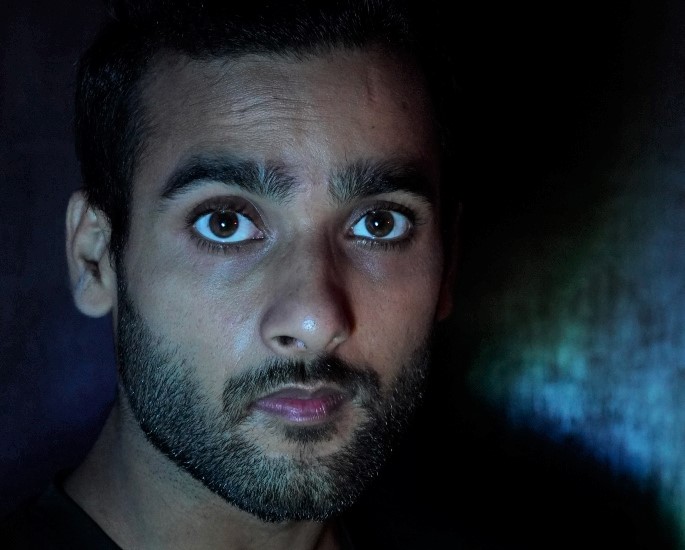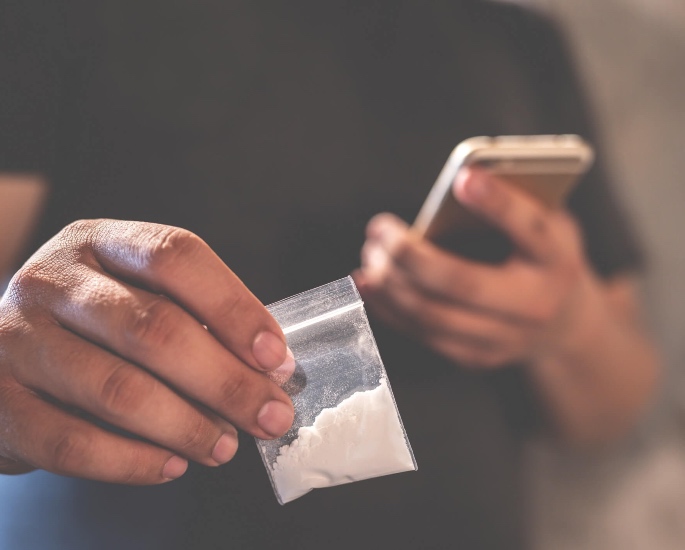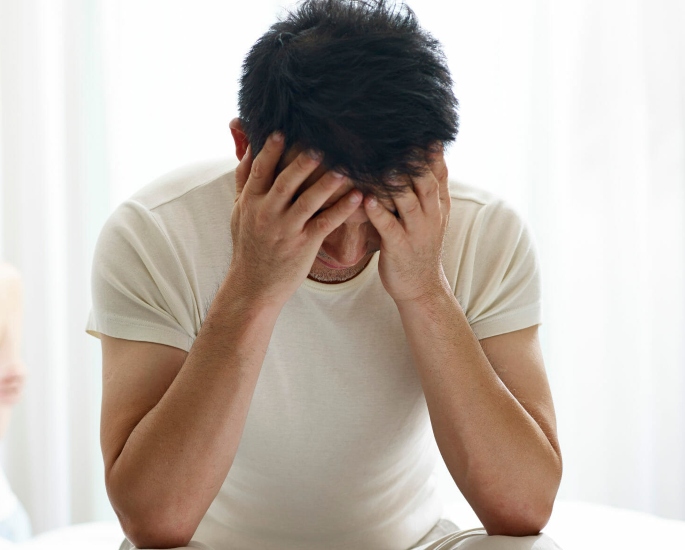"My mum was asking how much certain grams were"
Substance abuse in many communities faces extreme backlash. This was one of the main reasons Jas Gohal* found it hard to open up about living with his drug-addicted parents.
As young boys, Jas and his brother were constantly questioning their parents’ antics.
Whether it was their weekend parties, consistent sniffles or bursts of energy, the brothers were confused but brushed these events off as normal.
After all, witnessing the same daily habits and being stuck in this routine maintained a sense of normality. But, as we hear from Jas, it was anything but.
For Desi households, different kinds of abuse are often hidden due to the blanket of cultural ideologies.
Any deviation from a progressive and successful life, especially when it comes to using drugs, brings judgment and a sense of dishonour.
Of course, there is no justification for drug abuse, but the lack of open discussion and willingness to help addicts means it becomes harder for South Asians to open up about their issues.
Likewise, for the families directly affected by the actions of some addicts, there is no one to turn to for support.
In his own words, Jas details how the actions of his drug-addicted parents’ worsened and how it was difficult to reach out in some instances to control their behaviour.
Looking Back
Whilst it’s hard to pinpoint when Jas’ parents started taking drugs, he clearly remembers the initial occasions he began to pick up on certain habits.
Aged nine, Jas was unaware his parents were addicts. However, looking back, it is clear that he was just too young to process what was happening:
“Me and my brother grew up fairly nicely. We lived in a good enough neighbourhood, the people were polite and we never really ran into any trouble.
“Growing up, I think it was around 9 or 10 when I saw my dad smoking a cigarette for the first time.
“I was coming downstairs and he was on the front porch with half of his body outside and I just carried on but can remember the smell.
“I didn’t think anything of it but I remember him catching me in the kitchen and he shouted at me to get back into bed.
“A few days later, me and my brother saw my dad smoking again and we told our mum.
“Back then, we always had an idea that that stuff was kind of bad so didn’t know what else to do. But our mum got annoyed with us and said ‘it’s bad to spy on people’.
“Every weekend, our parents would tell us to be in bed by 9 pm which always upset us because we wanted to stay up late or watch TV.
“But we would get into bed, then they would tell us not to come downstairs.
“One time when I was 11, our mum forgot to close the bedroom door properly and I heard her whispering to my dad in the hallway about ‘sniff’ and ‘white’.
“Of course, I didn’t know what it meant at the time and carried on as normal.
“To be honest, as a kid you don’t pick up on things at the time, you’re just in a routine and told to do things that you think are normal.
“But looking back, there were all these clues that make me so upset.
“We went to a wedding party once and my dad was pacing up and down the house waiting for us all to get ready.
“He was wiping his nose constantly and I thought he had the flu so asked him if he wanted some medicine or to go to the doctor.
“Straight away he started getting aggressive and told me to ‘shut up’ and get in the car.
“My brother then came down and he shouted at him as well. I saw my mum come out of the toilet and she was wide-eyed, wiping her nose.
“We got to the party and my dad started drinking, dancing, talking to everyone and he was so energetic.
“Once the party was over, I asked my dad if he was okay. He was so drunk and told me and my brother we need to stop being so nosy.
“He screamed ‘all day every day you ask us questions, just be quiet and be proper boys and stop talking so much’. There were so many occasions like that.
“Mum and dad would go out every other weekend, sometimes they’d tell us and other times we would have one of our cousins looking after us and they would leave.
“They’d come back in the morning and look so tired. They always used to look like that after their nights out, but again I thought it was normal.
“Bins used to be full of empty clear packets. I’d see white stuff on the toilet or near the sink and think it was baby powder.
“They used to get so out of it and slowly started to leave residue everywhere and not clean up.”
“We would leave for school on Monday and they would still be asleep when we got back.
“I was so confused at the time and obviously found out after that they would just miss work or call in sick.
“I started caring for me and my brother daily like cooking and cleaning.
“Some days were okay and some days we wouldn’t hear from them. They’d just be locked away upstairs.
“They would come down and not talk or sometimes come down very energetic and we thought they were back to normal.
“When I asked them if I should call the doctor, they’d always get so mad. Even when family called, they’d told me to tell them they were out at the shops.”
Jas’ startling revelations about his drug-addicted parents emphasise how nonchalant they were about their actions, unaware of the subconscious effect they were having on their children.
Early weekend bedtimes, secretly going out and odd party behaviour raised more questions for Jas.
Whilst the replication of these antics each week became normality, it improved Jas’ alertness towards his parents’ demeanour.
Starting to Understand
As Jas started to mature and undertake more responsibilities for himself and his brother, he was noticing the extent of how drug-addicted his parents were.
The biggest issue when overcoming such an issue is admitting there is a problem. Therefore, once Jas understood how serious the issues at home were, he began to seek help.
Although, he quickly realised that seeking help and providing it was going to be tougher than he first thought:
“Slowly I picked up on what they were doing, I got older and was exposed to things at school.
“I actually remember a science class once and my teacher spoke about drugs, by then I kind of already knew.
“She was listing all these effects of different drugs and it was like a checklist in my brain saying ‘that’s how they were Saturday, that’s how they were Tuesday’.
“I was at home one day and was checking up on rehab centres.
“Dad would get so angry if I ever mentioned drugs or tried to talk to him about it. He’d say I’m a liar, call me a failure or taunt me. But mum was kind of the opposite.
“I could see she was too far gone but also like she wanted help. But they would keep it under wraps and play it off like drugs weren’t even in the house.
“I just thought what if our family knew, my dad’s brothers or my mum’s sister. I questioned if they did know and if I should tell them or even if they were doing it too.
“But I couldn’t turn to anyone, I wanted to keep my brother out of the loop for his sanity. I don’t actually know if he’s figured it out by now, I wouldn’t be surprised if he has.
“It just hurt so much. Seeing your parents like that. So in denial but needing help.
“As a kid, all you want to do is help your parents, succeed and make them proud. Yet, they were failing us.
“But, I kind of felt it was my fault. Like I should’ve given them more to be proud of in school or something, given them some type of distractions.
“As I was looking up those rehab centres, my mum caught me and told my dad. I could hear him shouting and my mum was trying to stop him from getting to me.
“He came into my room straight away in his drugged state and started to hit me.
“He slapped me, was swearing, hitting my arm, pushing me and telling me that I’m a goner.
“I just had to cradle up and take it, I didn’t have no other choice. My dad left and I sat there lifeless, crying.”
“No one came to me, not even my brother – I think he was scared.
“I went to the bathroom to clean myself up and overheard my parents downstairs. I think my dad was on the phone to someone about getting more drugs.
“My mum was asking how much certain grams were and if they could get any more from somewhere, and then my dad left.
“It was so odd living in a setting that was so violent and unsafe but from the outside, looked so calm.
“Later that night dad came back home and he and my mum went into the living room.
“They had the TV on full volume and were playing music, drinking, and of course doing some drugs.
“I could hear them shuffling about and then it was like someone was screaming.
“I was scared to go downstairs in case my dad started beating me so I tried to block the noise out. But the screams were getting louder.
“So I crept down the stairs and saw my mum crying on the floor. Her nose was bloody, she had a cut on the side of her face and had a bruised arm.
“My dad was stood by the coffee table hunched over and sniffing stuff off the table.
“Again, I thought this was my fault. He was angry from earlier when I was trying to look for help and he took out his aggression on us.
“My mum is no saint in this but she didn’t deserve that. Mothers are seen so highly in our culture so for a son to see this was gutwrenching.”
Even though Jas was in his teen years, he had to carry a level of composure that his drug-addicted parents didn’t have.
Through the unimaginable violence directed by his father toward him and his mother, Jas saw this as the last straw.
Whilst many children would have repressed these emotions, Jas used it as motivation to look for outside help.
Enough is Enough
Surrounded by such hostility and danger, Jas sought the support of other family members.
Although he was hesitant to do this due to the judgement that he knew Desi culture can have, helping his drug-addicted parents overcome their demons was the priority:
“I thought enough was enough. Our families never discussed things like this but I knew how bad it was in our culture.
“It’s like one mention of this, no matter if the person needs help, will automatically bring judgment and shame.
“But my parents needed help. Me and my brother needed help. I spoke to the family doctor the next day who was also Asian.
“I asked him about places or people I could speak to who could help us and understand things from our perspective.
“The main thing I found out then was there’s no real help in our culture towards these things.”
“Our people expect everyone to be on a straight road and if anyone does badly then they’re almost banished.
“But I had to tell my family so turned to my uncle, my dad’s brother. As soon as he found out, he was so shocked.
“He took me and my brother out of the house so we didn’t have to see our parents in that state anymore.
“My brother was confused at the time but we didn’t mention why we were leaving the house.
“My uncle spoke to the doctor and got some advice on how to help my parents with some therapy sessions.
“But of course, they shut him out for weeks before he could even talk to them about it.
“Being exposed to those hard drugs, seeing your parents taking them, and seeing the effects of it is a lot to take. Especially when you almost get used to it, that’s the hardest thing.
“Even now I barely have contact with my parents, every now and again I’ll talk to my mum.
“My uncle says they’re doing okay but still won’t get the help – they still think they don’t need it.
“Word got around in the family and now no one talks to them. I expected that because it’s just typical of how our community sees these things.
“I understand it wasn’t good what they made me and my brother go through.
“But I’m sure there loads of people like my parents who need help but can’t get it as easily as other people because they’re brown.”
As Jas and his brother distanced themselves from a household filled with drugs, violence and sadness, they could finally focus on themselves.
For South Asians, discussing drug issues or dependency is not an easy thing. Even more worrying are the resources available.
As Jas explained, trying to find the correct help from people who understand cultural values and ideologies is extremely difficult.
This is why many people are afraid to talk and come forward.
Those who are not directly drug-addicted can’t even open up about their emotions because of the backlash they may receive from family members or the community.
Jas told DESIblitz that he and his brother are now stabilising their own lives and focusing on moving forward. However, Jas did admit:
“I wanted to share this to make our own people understand that drug addiction is no joke.
“It scares people, kids especially, and can damage the mental health of so many – which it has for me.”
Although Jas’ drug-addicted parents are partly still in denial about their issues, the main thing is that they are getting support.
This stresses the need for more tools that South Asians can use for drug abuse and why it is prevalent that more open discussions are held about this topic.
If you or another person are suffering from drug abuse or are personally affected by any of the themes in this article, do not suffer in silence and reach out for help immediately:
- Cocaine Anonymous – 0800 612 0225
- Narcotics Anonymous – 0300 999 1212
- We Are With You
































































